They are rich and have made Mallorca their second home, usually a mansion, where they spend their holidays or visit nearly every weekend flying in from the main German cities. They are business people, and many have had the great idea of setting up a winery and making wines on the island.
Text: Enrique Calduch
Generally, they do not know much about the wine world, and so they leave the winery management and technical expertise in Spanish hands. It may be just some charming whim, but at the moment there are 14 wineries set up on German capital on the island and, in fact, many more are expected, in view of the auction of 700 hectares that the Balearic Island Government has reserved for extending the land planted under vine on the island. The fact is, these Germans are joining the locals and making the most of the surprising development in Mallorcan wine in recent years.
At the beginning of the 80s, there were not even ten wineries on the island bottling their wines. Today there are 70, and 63 of these come together under the protection of Indicación Geográfica Protegida Vinos de la Tierra de Mallorca. The wine revolution in Spain, which had already started in the 80s, also reached the island, where a small group of históricos had been making quality wine with their traditional grapes like Callet and Manto Negro for reds, and Prensal for their whites.
These grapes were essentially local to the island and only a few specialists on the Spanish mainland actually knew about them. After the 90s, a new wave of Mallorcan wine makers appeared who revolutionised the local wine scene, and were also well-known in Spain. Now there is another wave, inspired mainly by tourism. This phenomenon that has transformed the Balearic Islands in recent decades, initially put the brakes on the development of local wineries, but now it is the exact opposite.
Tourism and a particular type of tourism. It was around 1983 when the Spanish journalists who had attended a conference on tourism in Thessalonica in Greece, looked at one another in surprise when it was officially stated that all the tourism that flocked to Greece, including Athens, Peloponnese, the wonderful islands …, was more or less the same number that flocked, not to the Balearic Islands on the whole, or to the island of Mallorca, but simply to Arenal beach in Palma.
Fuelled by tourism
Now things have changed, a little, but back then the young farmers who could have promoted planting vineyards and building wineries, first went for work in the construction sector and then found jobs associated with this tourism, the island’s economic motor.
Then, however, quality tourism arrived, and not only concentrated in Sóller and the Sierra de la Tramontana, but all over the island. The tourists come from all over the world, but are mainly Germans, according to Inturea, a tourist marketing agency, who specify that 36 percent of the visitors to the island are Germans. It became fashionable among the German middle and upper classes, to regularly visit Mallorca or buy a home there to spend several months of the year, and this trend has changed the type of tourism. According to the same source, back in the 90s, a total of 80 percent of the foreign property investors on the island were Germans. It was even called Germany’s 17 bundesland or federal state, and everyone’s favourite.
Anyway, they come to enjoy the climate and the sea, and are also eager to enjoy the local produce, mainly quality products. And wine is one of them. That powerful, large audience, who are not all German, is already estimated at twelve million tourists a year who visit the island to consume, and this has inspired a new wave of wine producers, most of them locals, whom have been joined by German investors, in a very unusual phenomenon.
However, all the wine made in Mallorca only represents 13 percent of what is drunk on the island, as this powerful market is dominated by mainland producers who have well-established operations here.
IGP Vinos de la Tierra
The beginning of this new phase was somewhat chaotic, as wineries and vineyards were set up here and there, and so the Balearic Island Government decided to organise things and control the new wineries that were emerging. Therefore, they created the IGP Vinos de la Tierra de Mallorca denomination of origin, which now covers 63 of these wineries. To do this they created the Pla i Llevant denomination of origin (with head-quarters in Felanitx), to manage this new IGP; this way, the president of the former, Toni Bennassar and his team, also presided over the latter.
In fact, on the Balearic Islands there have been quite an assortment of acronyms and initials, and today they have the IGP de Vinos de la Tierra de Mallorca, and the equivalent in Menorca, Ibiza, Formentera and the Balearic Islands in general, which firmly associate all the islands, including Mallorca. Then, there are Vinos de la Tierra de Tramontana-Costa Nord, also in Mallorca; and two denominations of origin on the island, namely Binissalem-Mallorca and Pla i Llevant de Mallorca.
Millionaire Germans
However, Vinos de la Tierra de Mallorca groups together most of the wineries on the island, and all the Germans. The pioneering German wine enthusiast was Johan Matzen, a powerful businessman from Hamburg who founded Can Vidalet almost 20 years ago. It has about 14 hectares around the mansion where they live, and they make wines essentially with foreign varieties and some local Malvasía.
Perhaps the most powerful was Klaus Grag, who made his money in the steel derivatives industry, and was president of Teka, who sponsored Real Madrid and built Puerto Portals in a head-on collision as a fully-blown rival to Puerto Banús in Marbella. Mr. Grag, who was one of the sponsors who made a gift of the Fortuna yacht to Juan Carlos I, also entered the world of wine.
He rebuilt the small village of Biniagual, in the area of Binissalem, turning it into an idyllic venue, and he joined up with Miquel Angel Cerdá from Ánima Negra, one of the leading wine firms in Mallorca, to produce the wine, Veral. Klaus died at the age of 84 years old, and has been succeeded by his daughter Corinna, who still has the winery; Cerdá left the venture due to disagreements with the family over management issues.
Another emblematic investor is Hans-Peter Schwarzkop, a businessman from the world of cosmetics, whose brand and products can be found easily in shops and supermarkets. At the end of the 90s, he was looking for somewhere to build a home in Mallorca and he found it near Pollença, Can Axartel; a 200-hectare estate with an old mansion, virtually in ruins, that had belonged to Balearic nobility, and an old oil press. Schwarzkop bought it, rebuilt the mansion and tidied up the estate, and as he had so much space, he decided to make the most of it and make wine.
He excavated the mountain where there used to be an old quarry, and built a surprising winery on the rocks, with a 20-metre steel and glass façade. Inside they make wines with grapes from the 32 hectares planted under vine on the estate, and a further 22 that he has bought from inland vineyards, the first of which were planted in 1999.
The whole operation is organic and he uses local grapes plus some Cabernet, Merlot and Syrah. He works in collaboration with the university on the Balearic Islands, and they have one hectare of experimental vineyard planted with local varieties. The manager is Pep Cifré, who trained at the university, and the oenologist is Pedro Balda, who comes from a family of vine growers in Rioja. The rest of the team in the fields, winery and sales are all Spanish, except for one German salesman who resides in Hamburg.
Thyme and wine
And just as we see here, in virtually all the German wineries the managers, technicians and oenologists are Spanish. Most of them are new arrivals, as the fast development of the island’s wine sector has meant that technicians had to be imported from the Spanish mainland. First of all, from nearby Valencia from Escuela de Requena, and then from all over Spain. Also, the local government is taking action and is offering second degree professional training in vine growing and wine making, in an attempt to train local people in this new business field.
Michael Popp was also looking for an estate and a grand home. He owns Binorica, a pharmaceutical firm specialising in medicinal herbs with over 1600 employees in Nüremberg. He has thyme plantations in Mallorca, and it was also the perfect place for his second home.
He found Castell Miquel, an estate that made wine before the phylloxera and which later turned to growing olive and almond trees. Michael bought the property and renovated the old castle tower and magnificent mansion that stand in the middle of the estate, in Alaró. He works with French varieties and, although he initially worked with a German oenologist, for some time now the technical management has been in the hands of Núria Turdurí.
These are some of the big German names, but there are also smaller ventures, run by equally powerful people. One example is Son Juliana, in Santa Eugenia. It is a small, secluded winery that is very beautiful and modern, surrounded by a magnificent garden. It only has seven hectares planted recently, the oldest five years ago and the youngest three, and they make 40,000 bottles a year. The management and technical side are both run by Rafael Montero; and the property belongs to Günter Zimmer; he is the businessman who invented and patented the brake pad so that drawers and toilet seats close gradually instead of snapping shut.
A French trend
Virtually none of the owners live day-to-day in Mallorca, and they only come occasionally. They tend to favour Bordeaux, and French wines in general, and so although many of these German producers work with local grapes, they prefer using Cabernet Sauvignon, Merlot… because they think that they will sell better than if they use Callet, and, naturally they prefer Chardonnay to Prensal. The boxes they use for packaging their wines have the word Mallorca emblazoned as large as possible on them, to catch people’s attention. Another characteristic of the most recent wave, and also true in Son Juliana, is that they have to start their vineyards from scratch and then wait, or not, to make their wines.
Curiously, the Mallorcan sources we consulted about them prefer to remain anonymous. They hold them up to close scrutiny and can be quite cruel. “This is like the brick and mortar boom on the mainland”, one of them says. “Rich people who like to say they’ve got a winery and their own wine to show their friends. It looks very glamorous arriving to dinner and bringing your own wine from Mallorca. They’re not from the wine world and aren’t actually interested in it, and that’s why whenever there’s any problem or generational change they wash their hands, because in many cases, it may be the parents’ whim, but their children kids aren’t interested”.
These sources also admit that the German producers have redeveloped many magnificent old buildings and mansions that were in ruins, and they are very environmentally friendly; and then when the winery is up and running, they work out their figures. Friends they can sell to, clients, Christmas presents or other gifts, and so the first vintage works out quite well, but with the second or third things start to flounder. Their main objective is to sell in Germany, and it is calculated that they export about 15 percent. This is not enough, and so when things start to get tricky, and as they do not understand the wine world, they start selling their wines in Mallorca. However, they do not reduce their prices but luckily for them, the tourist market accepts their wines because they are made in Mallorca. Even so, they are businessmen and they do not like losing money, and either the business works well or they can sell up at any moment; for the moment, the business is proving profitable.
Es Fangar
You see, many people are put off by what happened with Es Fangar, perhaps the most ambitious of all the firms that we have mentioned so far. It was the most powerful and is now up for sale. Peter Einsenmann is the multi-millionaire owner of a firm that specialises in plants for the car industry, basically production and assembly lines for painting cars. One can imagine that the leading German car manufacturers used his services.
The parent company in Germany has gone into receivership, and although the businessman told Mallorca Zeitung that this would not affect his properties on the island, in the end, they have gone on the market. The most contentious ask that he returns the grants he received from the autonomous community, and Diario de Mallorca reports that they are asking for more than 100 million euro for the property.
But, let’s go back to the beginning. In 2002 Einsenmann bought one of the largest estates in Mallorca, 1064 hectares in Manacor, for 13.8 million euro. Here he set up a paradise of gardens, luxury holiday mansions to rent, and brought across his huge Hannover horse farm where he holds annual dressage and horse-riding competitions, and he also makes organic jams, oils and, of course, wine.
The estate has a total of 64 hectares planted under vine, and he produces labels like Elementos Fangar, Lo Cortinel-lo, N´amarat. The winery is on the Felanitx industrial estate because the Manacor Town Hall did not let him build it on the wine estate. This town hall and some neighbours have always been on the defensive with this businessman because as soon as he bought the property, he fenced it off completely, closing usual, local roads that people used. They were on the verge of going to court, but in the end, they reached an agreement, after years of conflict. The huge winery and the vineyards are now for sale, like everything else, and it is rumoured that it will probably be bought by another German.
This is the biggest case, but the people in Mallorca are also complaining about something else. And it is that the Germans sell most of their wine through wine tourism, hardly entering a competitive market that would increase the level of the island’s wines.
The would-be wine German wine producers have formed alliances with German tourism agencies operating in Mallorca or in Germany itself, and they take tourists to see their wineries, where they explain things in their own language, give them paid tastings and sell them their wines. During non-summer periods, and summer periods when there is no beach weather, the new wineries, both German and Mallorcan, are full with visits.
Unusually, the island still does not have any auxiliary wine infrastructure, and so bottles, corks, stoppers …all come from the Spanish mainland. This does not matter, because most of the wine drunk on the island also comes from the mainland. However, wine from Mallorca, which is more expensive in equivalent segments than Spanish wine, has a significant market niche which means it sells easily.
For the moment, the business is profitable, and although most of the investors are whimsical millionaires, they are also promoting wine on the island and starting up good productions with a promising future. Just like the more than 50 Mallorcan wineries that are developing and receiving this quality tourism and business with open arms.
Producers in Mallorca full steam ahead
The reason for writing an article about wineries and wines belonging to Germans makes sense, because it is difficult to find this situation in other wine regions around the world. It is also logical because the marvellous climate, people and different kinds of infrastructure in Mallorca, have made it a tourism paradise.
Nevertheless, the German contingent represents a third of the wineries started up by local Mallorcans, who are knowledgeable about their grapes and have been fighting for a long time to put their wines on the map, not just on their own island, but also throughout Spain.
Mallorca has been a wine region since it was colonised by the Romans, but its heyday was at the end of the 19th century when the phylloxera plague shook France and French merchants turned their eyes towards Spain, including Mallorca. In 1862 the plague set in, and in 1891 when the first case was detected on the island, there were 30,000 hectares of vineyard (today there are only 2000), producing about 50 million litres of wine. Shipping firms emerged that chartered ships carrying wine from Palma to Marseille.
When the phylloxera took hold in Mallorca, all that activity quickly disappeared, and vines were replaced with olive and almond trees. Even so, the local wine industry continued and in Felanitx, they started an oenological station and the island’s biggest co-operative, which finally closed in the 80s.
Yet a few wineries, virtually operating alone, continued to carry the flag for Mallorcan wines. The oldest of them all, Hereu de Ribas, also one of the oldest in Spain too, is 300 years old, and is now simply called Bodegues Ribas, in the town of Consell.
From those glorious years at the end of the 19th century, José Luis Ferrer Franja Roja still survives. In the 1980s, there was Antonio Nadal and his Nadal winery, currently run by his daughter, Magdalena. Also, from this time, we have the brothers, Miquel and Toni Gelabert, each with their own winery. Miquel Oliver and Jaume Mesquida, the latter now run by this daughter Bárbara, who is one of the representatives of modern wines from Mallorca.
In 1989, the first denomination of origin was created in Mallorca, Binissalem-Mallorca, and ten years later, the Pla i Llevant de Mallorca DO. However, it was not really until the 90s when Miquel Àngel Cerdá, Francesc Grimalt and Pere Obrador started up Ánima Negra, that there was another turn in the screw and Mallorcan wines enjoyed worthy prestige on the mainland, leaving wine enthusiasts from the rest of the country both surprised and wanting more.
Other creations appeared at this time too, such as the modern Macia Batle followed later by Binigrau led by Matías Batle, all of these in the front line of invention and promoting Mallorcan wines. When Francesc Grimalt separated from Anima Negra, he created 4 Kilos Vinícola which, in turn, became another reference for the island’s vibrant, new wines.
Alongside these, we also have the new generation of wine producers who have emerged in the 20th century, in the wake of profitable quality tourism. These several dozen people really understand their land, play with local and foreign grapes, support wine tourism and they are advancing full steam ahead towards, what looks like, a promising future.

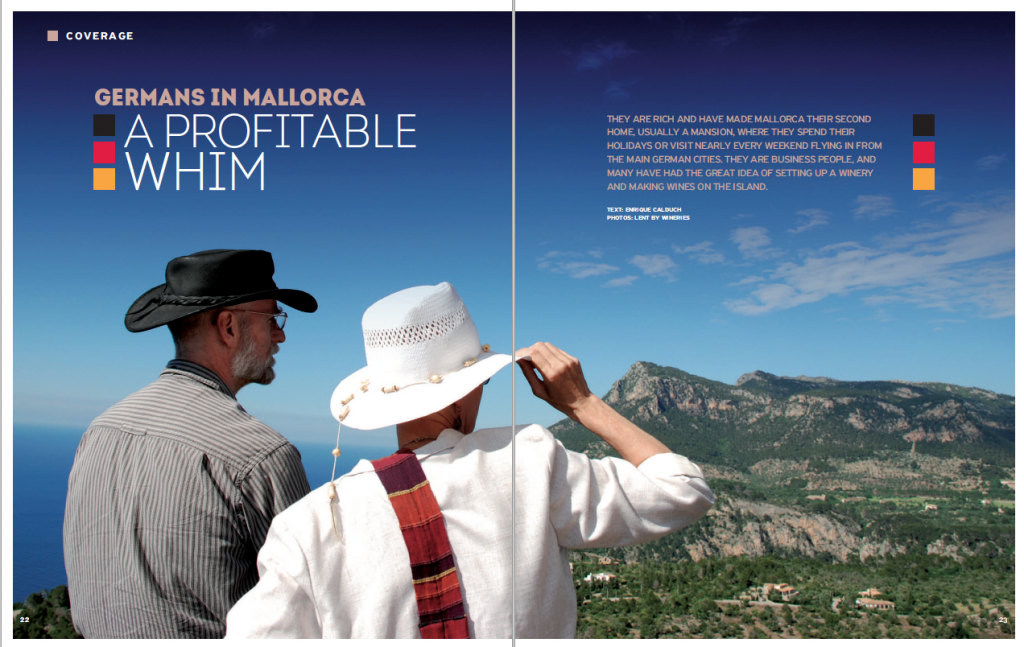
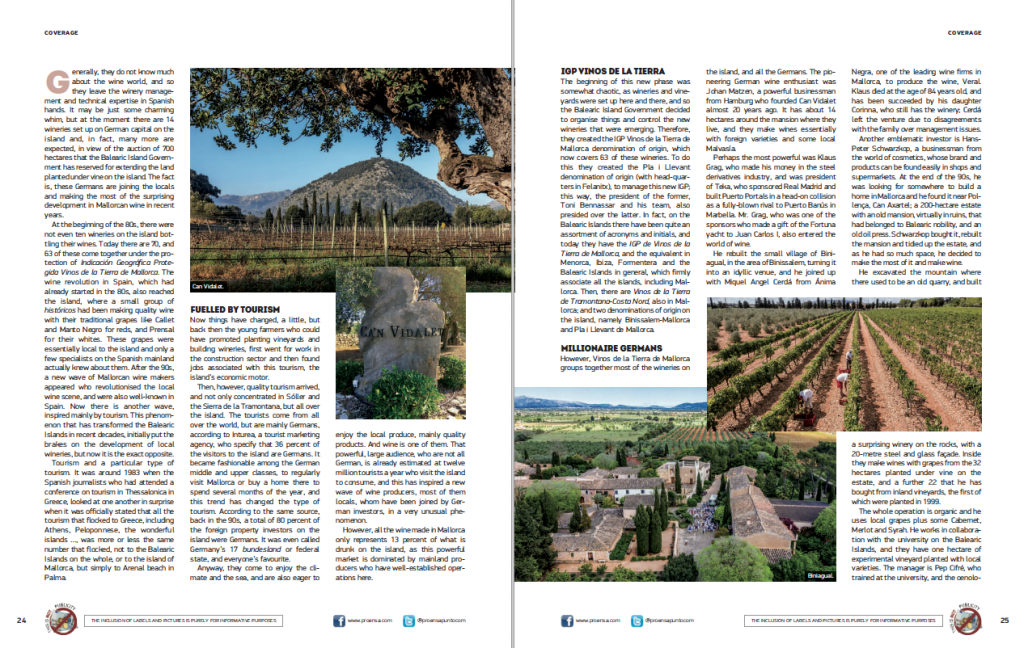
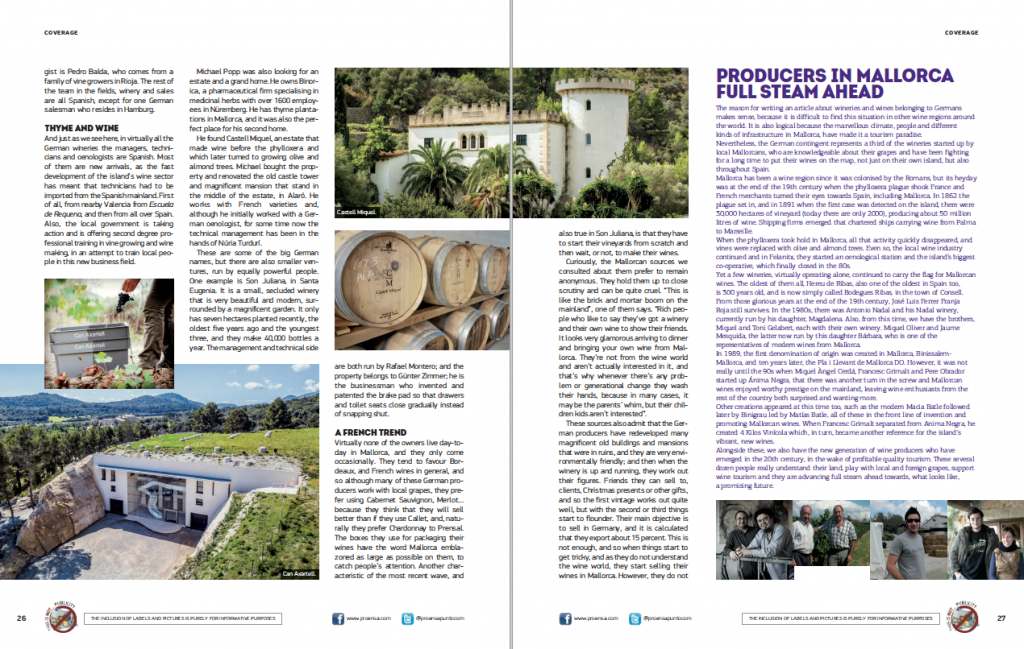
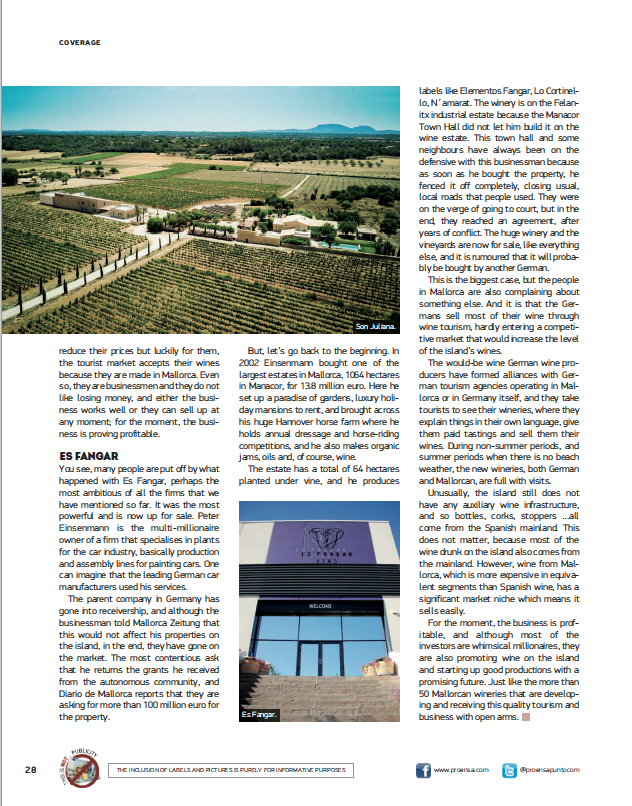
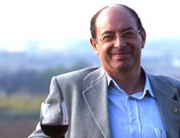
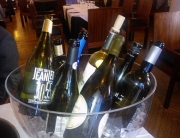
Deje su comentario
Debe estar logged in para comentar.